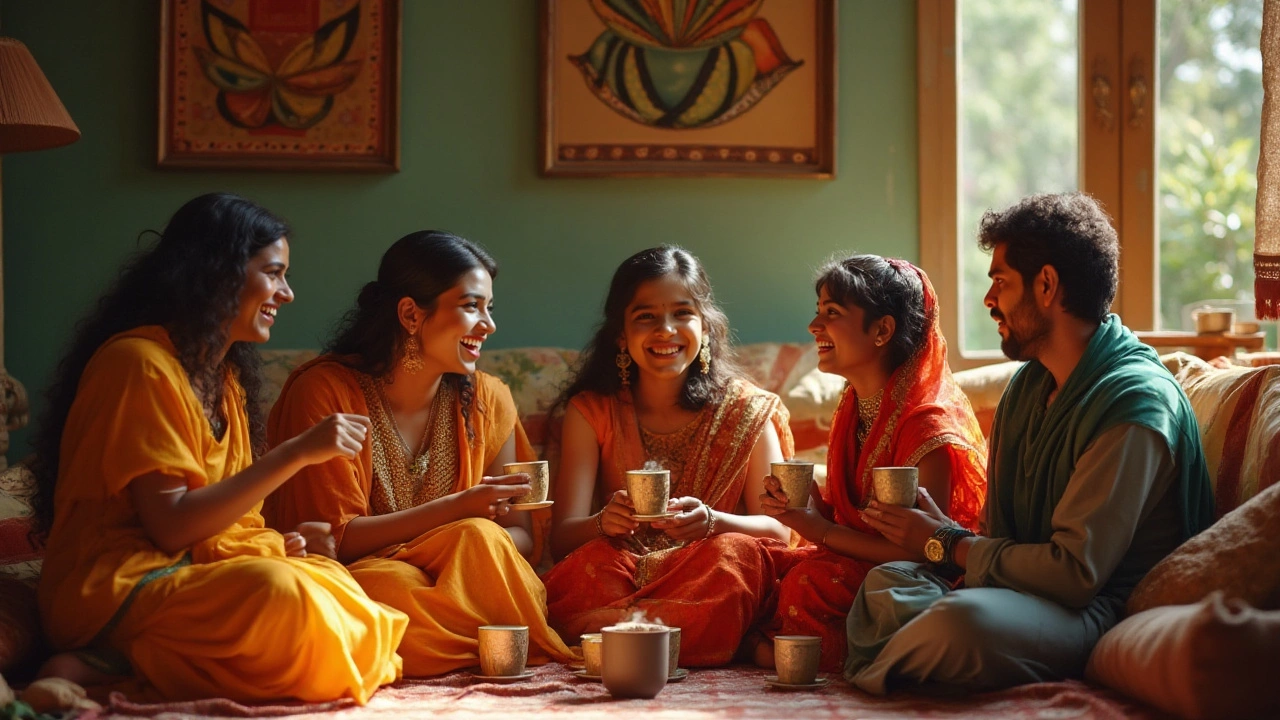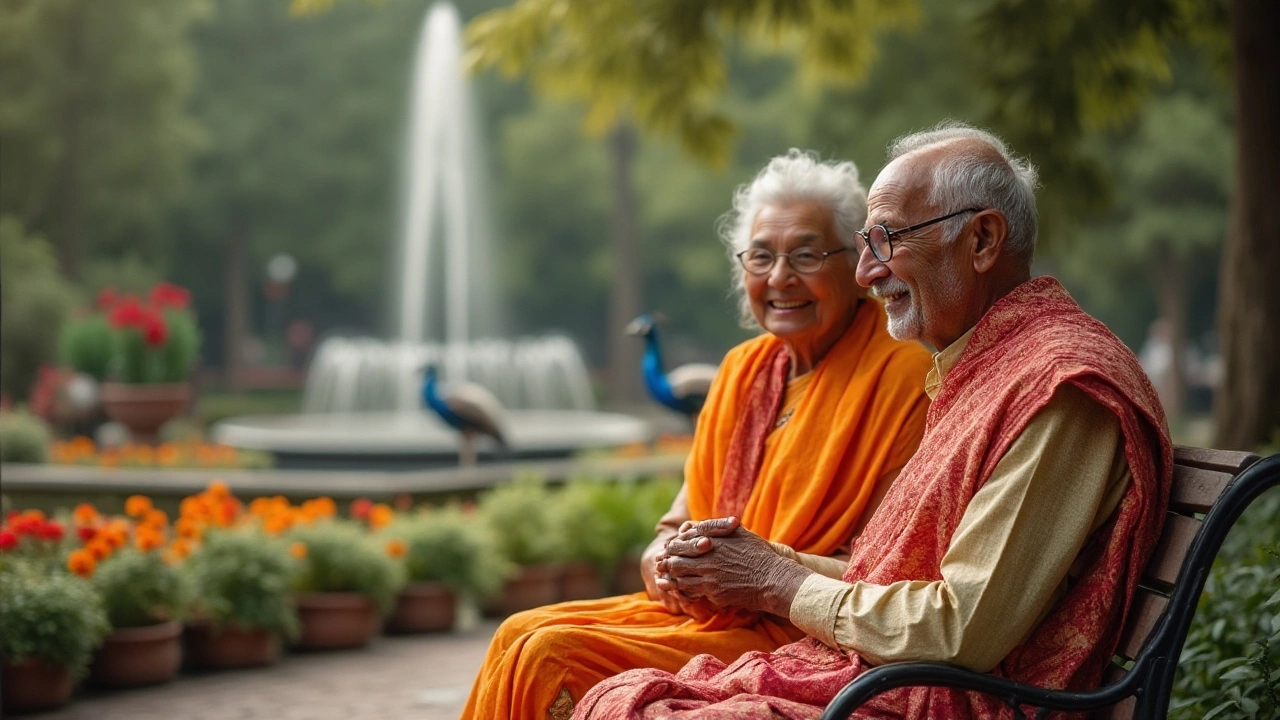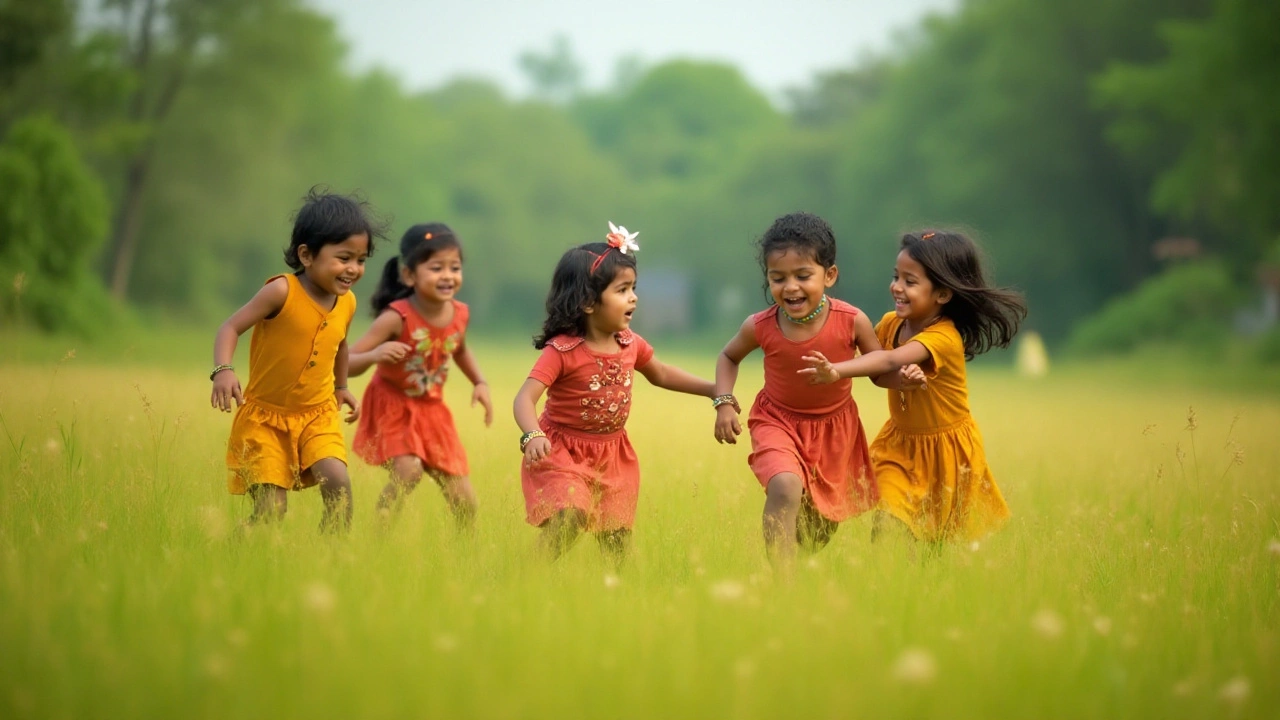
Friendship is a word we all know and cherish, transcending borders and languages to become a cornerstone of human connection. In India, friendships often carry a weight of tradition and cultural nuances that make them uniquely enriching. People here see friendships not just as a bond, but as a valued relationship that goes beyond casual interactions.
Drawing from a rich tapestry of history and culture, Indian friendship quotes encapsulate this sentiment beautifully. They often convey profound messages with simplicity, resonating deeply with those who read them. These one-liners are not mere words but reflections of heartfelt emotions, crafted to remind us of the joy and comfort a true friend can bring.
Understanding the essence of friendship in Indian context can offer guidance on nurturing meaningful relationships. From childhood pals to lifelong confidants, each connection offers its own lessons. Explore this captivating world where one phrase can hold a thousand sentiments, and learn how to foster bonds that withstand the test of time.
- The Essence of Friendship in Indian Culture
- Capturing Friendship in a Single Line
- Timeless Indian Friendship Quotes
- How Culture Shapes Bonds
- Tips for Strengthening Friendships
The Essence of Friendship in Indian Culture
Friendship in India is a relationship deeply interwoven with cultural traditions and social norms. The special bond is celebrated not only in personal circles but also mirrored through literature, cinema, and everyday life. Friendship here is more than just a connection; it's an unspoken promise of loyalty, trust, and unconditional support. Many Indians rely on their friendships to navigate life's twists and turns, making these bonds one of the most treasured relationships. A friendship in Indian culture echoes a sentiment echoed in Bollywood dialogues and Indian proverbs, often portraying friends as family one chooses.
Throughout history, Indian stories have illustrated how friendship transcends social and economic barriers. Consider the tale of Krishna and Sudama, which highlights selflessness and humility. Such stories infuse friendship with a spiritual dimension, aligning it with dharma, or duty, conceptually elevating it from just a mutual bond to a life-enriching relationship. The Sanskrit saying, 'Vasudhaiva Kutumbakam'—the world is one family—extends to friendships, suggesting a broad, all-encompassing spirit where every friend is part of a larger network of kinship.
In the mosaic of Indian society, friendship serves as an equalizer—a domain where caste, religion, and wealth sometimes take a backseat. At schools and workplaces, festivals infused with light and color, like Diwali and Holi, act as platforms to strengthen friendships beyond their usual confines. Celebrating friendship goes beyond just a single day like Friendship Day; it ingrains itself in daily interactions and cultural festivals. During these gatherings, people exchange sweets, share meals, and reinforce relationships by spending quality time with friends, thus nurturing bonds over the years.
Friendship quotes often emerge from these shared experiences, capturing entire narratives in simple yet powerful phrases. The popular saying, 'A friend in need is a friend indeed,' finds numerous parallels in Indian languages, stressing the supportive nature of these bonds. These phrases often become timeless mantras recited across generations. An Indian friendship quote could serve as both a reminder and a goal, offering wisdom from past generations to guide future ones in building steadfast relationships.
"Friendship is not only about finding similarities; it is about respecting differences." - A noteworthy sentiment echoed by the teachings of Mahatma Gandhi.
Friendships often play a pivotal role in shaping one's personal and professional life in India. The respect and affection shared often translate into opportunities for collaboration and mutual growth, particularly in communities where familial bonds might be formal or distant. Whether in a bustling city like Mumbai or a serene village, friendships here are tied to deeply-rooted cultural practices that strengthen them beyond the challenging tides of social change.
Friendship within the rich cultural tapestry of India is a multi-faceted entity, revered and cherished as a guiding force. It's a testament to the value of human connections that hold meaning across time and borders. Hence, understanding its essence offers invaluable insights into India’s soul and a lifelong lesson in the art of maintaining respectful and nurturing relationships.
Capturing Friendship in a Single Line
Friendship is one of life's greatest treasures and can often be challenging to convey with mere words. Yet, the beauty of a friendship quote lies in its simplicity—capturing the essence of a lifelong bond in just a few words. In cultures around the world, but especially in India, these quotes have a profound resonance. They echo the nuances of day-to-day life, from shared laughter to silent understandings.
"Simplicity is the ultimate sophistication." – Leonardo da VinciAlthough Leonardo spoke of simplicity in design, the same principle applies to words. A single line can capture the depth of an entire relationship. In India, friendships are often characterized by loyalty, unconditional support, and shared memories. This cultural framework makes one-liners particularly poignant, as they encapsulate feelings that words sometimes fail to convey fully.
Consider the phrase "A friend is one who overlooks your broken fence and admires the flowers in your garden." This quote perfectly embodies a friendship's forgiving nature, where imperfections are not merely ignored but are transformed into strengths. Indian friendships are legendary for this supportive element, where each friend's role morphs with life’s changing tides. A childhood friend remains an anchor through teenage trials, holding significance into adulthood, often viewed as chosen family.
These brief statements provide more than just wise words; they also serve as reminders of enduring values and cultural lessons. The act of distilling friendship into concise quotes involves deep reflection. It invites us to look inward and acknowledge our most cherished connections, understanding them from different perspectives. For centuries, poets, philosophers, and writers from India have been doing exactly this—capturing the quintessential magic of friendship in pearls of wisdom that transcend time.
One might stumble upon Rabindranath Tagore’s writings or Khushwant Singh’s novels and find vivid portrayals of friendship amid life's triumphs and tragedies. They express that friendship isn't just about cheerful occasions but also about standing steadfast during storms. Hence, capturing friendship in a single line is more about encapsulating myriad emotions, experiences, and timeless bonds which often surpass any literary elaboration.
In this endeavor, not all attempts succeed perfectly, but when they do, they create a quote so striking, it becomes a part of popular wisdom. Such quotes disseminate into society, often guiding us through interpersonal challenges. They help in forging stronger connections, acting as subtle reminders of what it means to be a friend. When a line resonates, it has the potential to inspire, comfort, and sustain, not just individuals but communities. The essence, woven into the cultural tapestry, becomes a shared heritage that generations cherish and hold dear.

Timeless Indian Friendship Quotes
Friendship quotes from India hold an extraordinary power, weaving together words that resonate with timeless wisdom and heartfelt emotion. Perhaps one of the most famous Indian sayings that encapsulates friendship is 'A friend in need is a friend indeed'. This phrase, though familiar globally, in the Indian context, speaks volumes about loyalty and support that friends provide in times of adversity. Such expressions of friendship often delve deeper than mere companionship, reflecting an enduring faith and a promise of unwavering support.
In India, friendships often intersect with spirituality, as seen in quotes by historical figures like Rabindranath Tagore and Mahatma Gandhi. Gandhi, for example, profoundly stated, "The best way to find yourself is to lose yourself in the service of others," which can be interpreted in friendships as giving selflessly to others. It's about the joy in being there for someone without expecting anything in return. This blend of philosophy and friendship is what makes these quotes universally appealing and perpetually relevant.
The rich diversity of India contributes to a plethora of friendship stories and quotes, each echoing the varied voices of its people. There's an interesting tradition in many Indian cultures to liken friends to family, often saying, 'Dost se bada dushman koi nahi, aur dost se bada koi dost nahi,' which means, 'No one is a greater enemy than a friend, and no one is a greater friend than a friend.' This illustrates the dual-edged nature of close bonds that might create deep connections or, if misunderstood, can lead to conflicts. These quotes are not merely representations of friendship but are cultural snapshots that offer insights into societal values and communal ties.
Sant Kabir famously said, "Dukh me sumiran sab kare, sukh me kare na koye, jo sukh me sumiran kare to dukh kahe ko hoye," suggesting that true friends will remember each other, irrespective of life's ups and downs.
Indian cinema, a vibrant reflection of the society, has also given us memorable quotes about friendship. The legendary Bollywood film 'Sholay' has immortalized the friendship between Jai and Veeru, offering lines that resonate with audiences about the power and importance of true companionship. Through Hindi movies and popular culture, many friendship quotes ring as universally appealing phrases, blending modern stories with ancient truths.
Interestingly, some data suggest that cultures emphasizing community and collaboration, like in India, often produce quotes with profound impact on relationships. A survey conducted a few years ago showed that approximately 78% of Indians believe friendship is about being there in difficult times, which underscores the cultural emphasis on loyalty and supportiveness. This reflects in their sayings and stories, where ardent devotion and deep connections are celebrated and held in high regard.
How Culture Shapes Bonds
In the rich mosaic of Indian society, culture profoundly defines how friendships are formed and nurtured. Unlike in certain Western societies where individualism might play a larger role, Indian friendships often bloom within the context of community and family. The social fabric here is intertwined, encouraging deep connections that echo the collective ethos of the culture. From an early age, children are taught the importance of coexistence and the strength found in unity. This teaching lays the groundwork for friendships that are as supportive as they are emotionally fulfilling.
The nuances of cultural values like respect for elders, acceptance within group settings, and the art of empathetic listening are filters through which friendships are often viewed in India. The practice of seva, which means selfless service, also significantly influences friendships. It’s not uncommon to witness friends going out of their way to help each other without expecting anything in return, a reflection of deep-seated cultural customs. In many ways, these friendships are bonds of benevolence, built on shared experiences and mutual aid. The intricate dance of give and take signifies friendship here, creating a strong tapestry that binds people together.
Expressing friendship in India often incorporates traditional practices during celebrations and festivals where friends and families gather and strengthen their ties. The importance of cultural festivals such as Raksha Bandhan or Bhai Dooj highlights the special roles friends might play, often equal to that of siblings. These cultural practices provide a shared space for reinforcing bonds, a testament to Indian hospitality and communal spirit. According to a study by the Indian Council of Cultural Relations, over 70% of Indians consider community events pivotal in sustaining friendships.
Rabindranath Tagore once wrote, "Depth of friendship does not depend on length of acquaintance." This quote encapsulates how bonds are fortified not just by time, but by the cultural engagements that continually nurture them.
Observing how urbanization and modernity are subtly changing the landscape of Indian friendships offers a fascinating contrast to age-old traditions. Younger generations may embrace digital interactions yet still maintain cultural roots, such as inviting friends for festivals and maintaining close-knit groups. Even with such modern shifts, there remains an inherent expectation to mirror practices from older generations, ensuring the essence of friendship remains unchanged amidst evolving expressions. This blend of contemporary and traditional reflects how culture continues to shape friendships, adapting yet steadfast.
In this dynamic landscape, friendship quotes often serve as verbal artifacts, distilling complex cultural narrations into succinct wisdoms. These quotes influence not only personal relationships but also how friendship is perceived within society. When quoting lines from notable Indian literature or films, individuals echo the larger, more universal concepts of kinship and harmony prevalent in Indian society. As the nation continues to grow and evolve, the shared cultural values that cement friendships will undoubtedly adapt while maintaining their timeless allure.Friendship quotes are not just words, but cultural touchstones that provide continuity across time, anchoring relationships in India's deep-rooted cultural legacy.

Tips for Strengthening Friendships
Friendships, much like a tree, require time and nurturing to grow into something sturdy and steadfast. In the vibrant tapestry of Indian relationships, friendships are especially cherished, often likened to familial bonds. To strengthen these precious connections, consider a few timeless strategies that resonate well within the cultural context. Meaningful friendships are built on trust and shared experiences, so prioritize spending quality time together. Whether it’s a weekly tea gathering or a spontaneous trip to the local market, these moments create a foundation of memories that strengthens your bond.
Communication is crucial, and it involves both expressing your thoughts and listening actively to your friend’s. Discuss not just the events of the day but delve into conversations that matter—aspirations, fears, and dreams. This depth of interaction helps in forging a relationship that is enduring and resilient to life's stresses. When misunderstandings arise, address them candidly but with empathy. Remember, the goal is not to be right but to preserve the friendship.
"Friendship… is born at the moment when one person says to another 'What! You too? I thought I was the only one.'" - C.S. Lewis
Acts of kindness, whether big or small, amplify the warmth in a friendship. Gestures such as remembering a birthday or helping in times of need reinforce the commitment to each other. In India, this could mean participating in festivals together or sharing home-cooked food, symbolizing the care and connection shared between friends. Ensuring that your friend feels valued is pivotal in strengthening this bond.
Let’s not forget the importance of giving space. Every individual needs personal time for reflection and growth, and respecting this need can actually bring friends closer over time. Encourage each other’s interests and ambitions outside of the friendship. It's this balance between closeness and independence that truly fortifies a friendship, making it capable of weathering any storm.
And finally, practicing gratitude can make a world of difference. Express appreciation regularly, whether it’s through a heartfelt note or a simple thank you for being there. When friends feel appreciated, it enhances their sense of belonging and strengthens the relationship manifold. By investing time and effort into these elements, you’d find friendship not just to be a relationship, but a vital part of life that enhances your own growth and happiness.